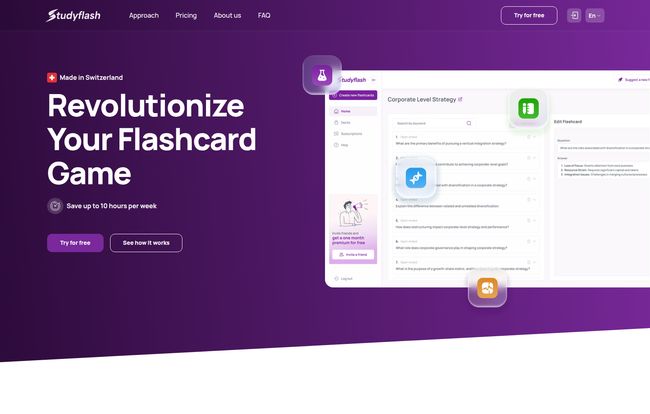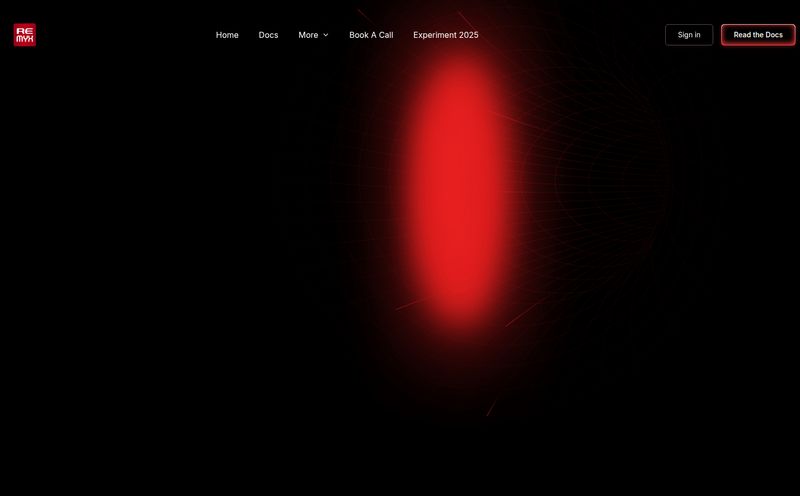Let’s have a little chat. Remember those late nights in the library, surrounded by a mountain of textbooks, with a pack of index cards that seemed to be mocking you? My wrists are aching just thinking about the thousands of cards I hand-wrote for my finals. The whole process was a soul-crushing, time-sucking vortex. You'd spend more time creating the study materials than actually, you know, studying them.
It was a necessary evil. Or so we thought.
In the world of SEO and digital marketing, we're always talking about automation and efficiency. So when I heard about an AI tool designed to take on the drudgery of flashcard creation, my ears perked up. It’s called Studyflash, and it’s making some pretty bold claims about revolutionizing the way students study. But does it live up to the hype? I decided to take a look.
So, What Is Studyflash, Really?
At its heart, Studyflash is an AI-powered platform that turns your study materials—lecture notes, PDF documents, textbook chapters—into a deck of digital flashcards. Simple, right? But the magic isn't just in digitizing cards. It’s that the AI does the heavy lifting for you. It reads your content and generates the questions and answers itself.
This isn't just some random app, either. It’s “Made in Switzerland,” and the homepage casually mentions it’s loved by over 300,000 students from places like Harvard, Cambridge, and ETH Zurich. Okay, that got my attention. When students from institutions that are notoriously demanding are using a tool, there’s usually something to it. It’s not just hype; it's a sign of a tool that genuinely solves a problem.
How It Works: From Brain Dump to Brain Gain
The process is refreshingly straightforward. You feed the machine your notes. You can copy-paste text, upload a file, and then the AI gets to work. It chews through your material and, a few moments later, presents you with a set of flashcards.

Visit Studyflash
But here’s the part that really interests me as someone obsessed with optimization. Studyflash claims the platform uses the “best learning algorithms.” This is marketing-speak, but for us in the know, it points directly to established cognitive science principles. I’m talking about things like active recall (the act of actively retrieving information from your brain) and spaced repetition (reviewing information at increasing intervals). These aren't just trendy buzzwords; they're scientifically-backed methods for moving information from short-term to long-term memory. It's the difference between cramming for an exam and actually learning something.
So, the platform isn’t just making your cards, it’s building a system designed to make the information stick. That's a huge step up from the old shoebox full of index cards.
The Good Stuff: What I Genuinely Liked
The Insane Time-Saving Factor
Let's be blunt: this is the main draw. The single biggest benefit. I once spent an entire weekend doing nothing but creating flashcards for a European history final. It was mind-numbing. The idea of uploading my notes and getting a usable deck in minutes feels like a superpower. For students juggling multiple classes, part-time jobs, and maybe even a semblance of a social life, reclaiming those hours is invaluable. It’s not just a convenience; it’s a competitive advantage.
Studying Smarter, Not Just Harder
Have you ever stared at a page of notes, and your brain just fogs over? You don't even know what's important anymore. The AI in Studyflash acts like a very efficient teaching assistant. It’s pretty good at identifying key terms, definitions, and core concepts to turn into question-and-answer pairs. It helps you focus on what matters, filtering out the fluff. Of course, you should review them, but the initial heavy-lifting is done.
The Learning Science is Baked In
I mentioned this before, but it's worth repeating. A tool that incorporates principles like spaced repetition is fundamentally more effective than one that doesn't. Systems based on the Ebbinghaus forgetting curve have been a quiet revolution in learning for years. They show you cards you're about to forget and push back the ones you know well. It optimizes every minute of your study session. It’s this built-in intelligence that separates a professional tool from a simple app.
Let’s Be Real: The Not-So-Perfect Parts
No tool is perfect, especially one relying on the current state of AI. To give you an honest review, we have to talk about the downsides. It’s only fair.
The AI Isn't a Mind Reader (Yet)
The AI is good, but it's not infallible. Occasionally, it might generate a card that's a bit awkward, misinterprets a sentence, or focuses on something you consider trivial. You can't just blindly trust its output. Think of it as a fantastic first draft. You still need to be the final editor, quickly scanning the deck to make sure the cards make sense for you. It saves you 90% of teh work, not 100%.
The Achilles' Heel: Equations and Images
This is a big one. The provided info is upfront that Studyflash isn’t great with formulas, mathematical equations, or images that don't have text. If you're a history, literature, or law student, you're in the clear. But if you’re a STEM major studying physics, advanced calculus or organic chemistry, this might not be your silver bullet. The AI is built for text, and its struggles with complex, non-linguistic data are a significant limitation for a huge chunk of the student population. Something to keep in mind.
What’s the Damage? A Look at Studyflash Pricing
Okay, so how much does this magic cost? The pricing model is refreshingly simple, and I'm a big fan of it.
| Plan | Price | Details |
|---|---|---|
| Free Trial | €0 | Create your first deck for free to see how it works. |
| Yearly Subscription | €5 / month (billed annually) | Full access to become a “study magician.” |
My take? The free-deck trial is a complete no-brainer. You have nothing to lose by trying it out on one of your lecture notes. And the yearly plan... €5 a month is less than two lattes. If this tool saves you even a few hours of tedious work each month, the return on investment is massive. It’s priced for a student budget, and I respect that.
Final Verdict: Is Studyflash Worth The Hype?
So, here’s the bottom line. Studyflash is a genuinely useful, powerful, and well-designed tool for a specific type of student. If your studies are text-heavy, I think it's absolutely worth the small investment. The time it saves is its most compelling feature, and the integrated learning science means you're not just working faster, you're learning more effectively.
However, if you're deep in the world of STEM, its current limitations with formulas mean you should probably stick to other methods for now. It’s a specialized tool, and that’s okay.
For me, if this tool had been around when I was in university, I would have jumped on it without a second thought. It’s a prime example of AI being used in a practical way to solve a real, annoying problem. It's not about replacing human thought, but about augmenting it—by getting the boring stuff out of the way so you can focus on what really matters: actually understanding the material.
Frequently Asked Questions
- 1. Is Studyflash really free to try?
- Yes, it is. The website clearly states you can create your first flashcard deck for free to “experience the magic first hand.” It’s a great way to see if it works for your specific subject matter before committing.
- 2. Can Studyflash handle my handwritten notes?
- Based on its stated weakness with images and its focus on text input, it's highly unlikely. The AI needs clean, digitized text (like from a PDF, Word doc, or pasted text) to work effectively. You'd need to transcribe your handwritten notes first.
- 3. What learning techniques does Studyflash use?
- While they use the general term “best learning algorithms,” the functionality strongly implies the use of active recall (by its question-and-answer format) and spaced repetition systems (which optimize when you see certain cards again).
- 4. How accurate is the AI in creating flashcards?
- It's generally quite accurate for text-based subjects, but not perfect. You should always plan to spend a few minutes reviewing the generated deck to correct any errors or remove cards that aren't relevant to you. Think of it as a 90% solution.
- 5. Can I use Studyflash on my phone?
- Most modern web platforms are designed with mobile-responsiveness in mind, allowing you to study on the go through your phone's web browser. This is pretty standard for any digital study tool today.
Reference and Sources
- Studyflash Official Website
- Murre, J. M. J., & Dros, J. (2015). Replication and Analysis of Ebbinghaus’ Forgetting Curve. PloS one.



